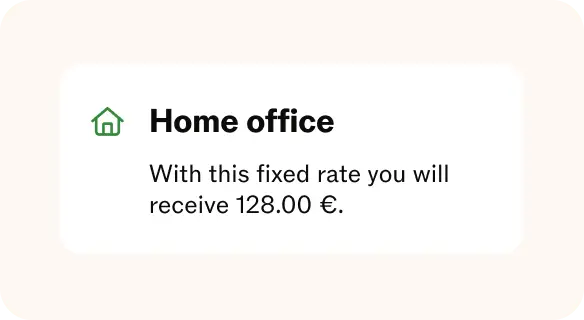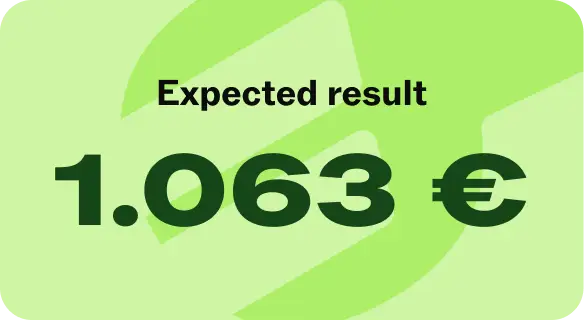Attention: The tax deadline ends on July 31! File now and avoid penalties.
The best way to do your taxes
Take a photo of your income tax notice, answer simple questions and you're done. This way you can secure your refund in no time!

File with flexibility: For smartphone and computer

Germany's most popular tax app: + 5 million downloads
Taxfix advantages for all
With Germany's most popular mobile tax app, you can do your tax return in no time.

Guided and intuitive process
Answer our easy-to-understand questions, or sit back and have your taxes done by an independent tax advisor.

Reliable check of your data
We review the data from your income tax certificate for accuracy using our plausibility check.

Estimated tax refund, free of charge
If you choose to file your own taxes with Taxfix, we’ll calculate how much you can expect back from the tax office.

Efficient and secure tax returns
Only answer what's related to your case. Or have your taxes prepared and submitted by an independent tax advisor.
Tax deadline in July? No problem
Submit your tax return now easily and on time by July 31 and avoid any late fees.
Start now for freeWe have already recovered over 4 billion euros for our customers! Taxfix's mission is to enable financial participation for everyone.
Tax experts work at Taxfix.
Employees counts Taxfix currently.
Prepare your own tax return
From €39.99
For anyone who wants to file an easy and secure tax return themselves. Free refund calculation, pay only upon submission.

Receive an advance calculation of your refund and pay only when you turn it in
Guided and intuitive process with simple questions
Automatic data retrieval: simply retrieve your income data from the tax office and have it pre-filled
The general deadline applies July 31st
From €59.99 for married couples or registered partnerships looking to file a tax return together
Save money and secure exclusive benefits with Taxfix+
Get your tax assessment for free and only pay when you submit your return
Our Expert Service does it for you
From €99.99
For those who are unsure or can't find the time – hand your taxes to an expert.

Provide a few necessary documents in minutes
An independent tax advisor will prepare your tax return for you
Personalised document upload: Only submit documents that are completely necessary
Detailed check of your information
Benefit from an extended tax deadline (April 30th 2026)
Hand over, pay, relax.
| Function | ELSTER | Taxfix |
|---|---|---|
| Official ELSTER interface | ||
| No time-consuming registration | ||
| User-friendly, thanks to intuitive question-answer flow | ||
| Additional tax tips and instructions | ||
| Easy to use without tax knowledge | ||
| Reliable check of your data | ||
| Free tax refund calculation | ||
| Cross-platform data synchronisation | ||
| Process & guidance in English | ||
Price | 0 Euro | from €39.99* |
*€59.99 for married couples and registered partnerships filing jointly | ||
Why pay for Taxfix, if ELSTER is free?
The most important reason: Taxfix allows you to do your tax return in English. Additionally, the app developed by tax experts helps you get the most out of your taxes. Simply answer a few simple questions and get an average of 1,172 euros back.
Developed for
Singles
Families
Students
Part-time workers
Employees
Civil servants
Expats
Apprentices
Developed for you.

Your advantages
Taxes without forms: Answer our easy-to-understand question-answer process, or have your tax done by an independent tax advisor.
The best way to do your taxes
The choice is yours: complete the simple question and answer process, or use Expert Service and have your taxes done for you by an independent tax advisor. Either way, you can avoid complicated tax jargon.
How it. worksPaperless document upload
Taxfix makes your tax return completely digital. Simply photograph or upload your documents. Taxfix then automatically transfers all important information - accurately and stress-free!
Start uploading your documentsGet an estimated tax refund quickly
We tell you how much you get from the tax office. Not only do we automatically deduct flat rates that you can use to save taxes, we also show you transparently what information you submit.
Get your refund estimateCompletely secure
Your data is always transmitted in encrypted form to the Taxfix servers and via ELSTER to the tax office. We use secure encryption technologies that are also used by banks.
See how your data is protectedTaxes made easy
Because no one speaks like a tax form, we have simplified complicated tax terms for you. Answer easy questions and get an average refund of €1,063 – no tax knowledge needed.
Start now for freeMultiple awards!
With Germany's most popular mobile tax app, you can do your tax return in no time.

Elster
Thanks to the API interface to ELSTER, your data will be securely transmitted to the tax office.

Finanztip
The consumer magazine Finanztip recommends Taxfix as tax software for a simple tax return.

Best reviews
More than 255.000 positive reviews with an average rating of 4.6 stars speak for themselves.

Made in Germany
Innovation meets quality. Taxfix is developed and designed in Berlin. By people from all over the world.
Frequently asked questions
With our app developed by tax experts, we successfully help people every year.
There are two ways to file your tax return with Taxfix: complete the simple question-and-answer process via app or browser, or have your taxes done by an independent tax advisor using Expert Service .
If you do your tax return yourself, you can get a free calculation of your estimated refund before submitting to your local tax office via the official ELSTER interface.
Do your own taxes: After registering through the app or browser, you will answer an average of 70 questions, specifically tailored to your tax case. You will then immediately receive a free calculation of your estimated refund. If you choose to submit your taxes at that point, we will submit your tax return to your local tax office. Once the tax office has processed your return, your potential refund will be paid into your account and you will receive your tax assessment.
Have your taxes done for you: With Expert Service , simply upload a few documents and receive your tax return in a matter of days. All you have to do is check and approve it.
Download the Taxfix app for free from the Apple App Store, the Google Play Store, or access our site in your web browser. At no extra cost, you can calculate your expected tax refund. Alternatively, you can use Taxfix Expert Service and have your tax return done for you by an independent tax advisor. Find the current prices for both services on the Taxfix costs page .
Submitting a tax return is definitely not something you do off the cuff. And when specialized knowledge is required, it’s understandable to be cautious or even feel sceptical.
For questions that require explanation, Taxfix offers info texts and corresponding advice articles or tax tips. These resources will help with general tax questions on specific points, but not with individual tax questions.
Your question not yet included? We have collected the most frequently asked questions and our answers in our Support Center .
Against inflation: Complete your tax return without any forms and in less than half an hour - with the Taxfix question-and-answer procedure.
Start now